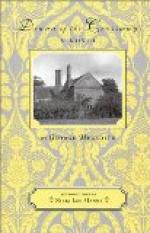Lady Dunstane called on her, ostensibly to let her know she had taken a house in town for the season, and in the course of the chat Mrs. Cramborne Wathin was invited to dinner. ’You will meet my dear friend, Mrs. Warwick,’ she said, and the reply was: ‘Oh, I have heard of her.’
The formal consultation with Mr. Cramborne Wathin ended in an agreement to accept Lady Dunstane’s kind invitation.
Considering her husband’s plenitude of old legal anecdotes, and her own diligent perusal of the funny publications of the day, that she might be on the level of the wits and celebrities she entertained, Mrs. Cramborne Wathin had a right to expect the leading share in the conversation to which she was accustomed. Every honour was paid to them; they met aristocracy in the persons of Lord Larrian, of Lady Rockden, Colonel Purlby, the Pettigrews, but neither of them held the table for a moment; the topics flew, and were no sooner up than down; they were unable to get a shot. They had to eat in silence, occasionally grinning, because a woman labouring under a stigma would rattle-rattle, as if the laughter of the company were her due, and decency beneath her notice. Some one alluded to a dog of Mrs. Warwick’s, whereupon she trips out a story of her dog’s amazing intelligence.
‘And pray,’ said Mrs. Cramborne Wathin across the table, merely to slip in a word, ‘what is the name of this wonderful dog?’
‘His name is Leander,’ said Diana.
’Oh, Leander. I don’t think I hear myself calling to a dog in a name of three syllables. Two at the most.’
No, so I call Hero! if I want him to come immediately,’ said Diana, and the gentlemen, to Mrs. Cramborne Wathin’s astonishment, acclaimed it. Mr. Redworth, at her elbow, explained the point, to her disgust. . .
That was Diana’s offence.




